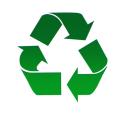Green Resources Green Info & Resources
Each and every person on our planet impacts our environment - every day and with every action.
Students play a vital role Point Park University becoming an even more environmentally friendly and sustainable campus. Check out our Green Brochure to see some simple ways you can help to save energy, water and paper.

Point Park Recycles
Green Facts
From how much water and electricity you use and how you use it to thinking before you print, check out some fascinating facts that may change the way you see your daily activities.
Save Water 
- A hot water faucet that leaks one drop per second can add up to 165 gallons a month. That's more than one person uses in two weeks.
- An energy-smart clothes washer can save more water in one year than one person drinks in an entire lifetime.
- An automatic dishwasher uses less hot water than doing dishes by hand -- an average of six gallons less, or more than 2,000 gallons per year.
- An American family of four uses up to 260 gallons of water in the home per day.
- Running tap water for two minutes is equal to 3-5 gallons of water.
- A 5-minute shower is equal to 20-35 gallons of water.
- A full bath is equal to approximately 60 gallons of water.
- Water efficient fixtures can cut water use by 30 percent.
Save Energy 
- Although accounting for only 5 percent of the world's population, Americans consume 26 percent of the world's energy.
- America uses about 15 times more energy per person than the typical developing country.
- A heavy coat of dust on a light bulb can block up to half of the light.
- When you turn on an incandescent light bulb, only 10% of the electricity used is turned into light. The other 90% is wasted as heat.
- A compact fluorescent light bulb uses 75 percent less energy than a regular bulb and it can last up to four years.
- A crack as small as 1/16th of an inch around a window frame can let in as much cold air as leaving the window open three inches.
- Some new refrigerators are so energy-smart they use less electricity than a light bulb.
- Every time you open the refrigerator door, up to 30 percent of the cold air can escape.
- Every year, more than $13 billion worth of energy leaks from houses through small holes and cracks. That's more than $150 per family.
- Office buildings use approximately 19 percent of all energy consumed in the United States.
- Heating, ventilating and air conditioning systems account for 40-60 percent of total energy use in the commercial sector.
Limit Waste Materials 
- A single-sided, 10-page letter costs $.55 to mail. If copied on both sides, the letter uses only five sheets and costs only $.34 to mail.
- One ton of 100 percent recycled paper saves the equivalent of 4,100 kWh of energy, 7,000 gallons of water, 60 pounds of air emissions and three cubic yards of landfill space.
- In the United States, more than 40 percent of municipal solid waste is paper - about 71.8 tons a year.
Point Park Recycles
Point Park's recycling policy is aimed at building a greener campus. Students, faculty and staff can recycle paper, metal cans, glass, aluminum cans and plastic. Each campus building floor has containers for recyclable materials. If you cannot locate a recycling container on campus, please contact Physical Plant at 412-392-3490.
Point Park recycles all Toshiba copier toner cartridges and waste containers for zero waste.
Point Park has contracted with Toshiba Business Solutions for our photo copiers. Along with this, Toshiba offers their eCycle Program called Close the Loop®. This program allows for the University to have a central repository for all Toshiba brand photo copier toner cartridges and waste containers.
Point Park recycles any brand inkjet and laser printer toner cartridges
The University has a central repository for all printer cartridges - all brand names - located in Printing and Office Services. Office Depot works closely with Clover Technologies Group, which has developed a closed loop environmental process to ensure that every component of used toner cartridges they collect is either remanufactured or recycled.

